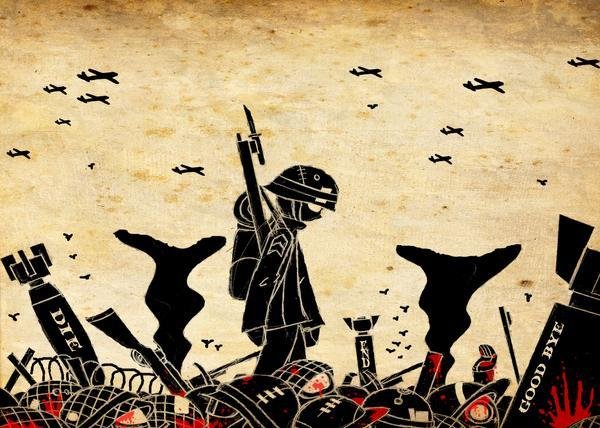Mike’s Notes: It has been said that those who don’t learn from history, are doomed to repeat it. Not only did the US fail to learn the lesson provided by the Soviet Union’s defeat in Afghanistan, but we also did not learn from our own experience in trying to fight a war on religion.
Like most Americans, I received my history education in high school and college. At the time, I did not realize that what I was learning was carefully crafted to only highlight our positive achievements with less positive events heavily redacted.
I never heard about the Moro War, and now reading about it, I find our current Middle East involvement eerily similar. It seems that we have learned nothing in the last 100 years. We always make the same mistakes over and over ad nauseum.
For a decade and a half, the U.S. Army waged war on fierce tribal Muslims in a remote land. Sound familiar?
By Danny Sjursen – TomDispatch
As it happens, that war unfolded half a world away from the Greater Middle East and more than a century ago in the southernmost islands of the Philippines. Back then, American soldiers fought not the Taliban, but the Moros, intensely independent Islamic tribesmen with a similarly storied record of resisting foreign invaders. Precious few today have ever heard of America’s Moro War, fought from 1899 to 1913, but it was, until Afghanistan, one of America’s longest sustained military campaigns.
Popular thinking assumes that the U.S. wasn’t meaningfully entangled in the Islamic world until Washington became embroiled in the Islamist Iranian revolution and the Soviet invasion of Afghanistan, both in the pivotal year of 1979. It simply isn’t so. How soon we forget that the Army, which had fought prolonged guerrilla wars against tribal Native Americans throughout the nineteenth century, went on—often led by veterans of those Indian Wars—to wage a counterinsurgency war on tribal Islamic Moros in the Philippine Islands at the start of the new century, a conflict that was an outgrowth of the Spanish-American War.
That campaign is all but lost to history and the collective American memory. A basic Amazon search for “Moro War,” for instance, yields just seven books (half of them published by U.S. military war colleges), while a similar search for “Vietnam War” lists no less than 10,000 titles. Which is curious.
The war in the Southern Philippines wasn’t just six years longer than conventional American military operations in Vietnam, but also resulted in the awarding of 88 Congressional Medals of Honor and produced five future Army chiefs of staff. While the insurgency in the northern islands of the Philippines had fizzled out by 1902, the Moro rebels fought on for another decade. As Lieutenant Benny Foulois—later a general and the “father” of Army aviation—reflected, “The Filipino insurrection was mild compared to the difficulties we had with the Moros.”
Here are the relevant points when it comes to the Moro War (which will sound grimly familiar in a twenty-first-century forever-war context): the United States military shouldn’t have been there in the first place; the war was ultimately an operational and strategic failure, made more so by American hubris; and it should be seen, in retrospect, as (using a term General David Petraeus applied to our present Afghan War) the nation’s first “generational struggle.”
More than a century after the U.S. Army disengaged from Moroland, Islamist and other regional insurgencies continue to plague the southern Philippines. Indeed, the post-9/11 infusion of U.S. Army Special Forces into America’s former colony should probably be seen as only the latest phase in a 120-year struggle with the Moros. Which doesn’t portend well for the prospects of today’s “generational struggles” in Afghanistan, Iraq, Syria, and parts of Africa.
Read entire story at NationOfChange.org

Michael Chester is retired from his career in industrial technology. After graduating from college, he taught this subject until deciding that he preferred doing the job himself more than teaching it. At various times during his career, he has designed, built, installed, and repaired industrial manufacturing machinery. His specialty was in electrical and electronic controls.
After retiring, he concentrated more on his hobby of cooking and attended one of the top culinary schools in the US. Mike competed in bass fishing tournaments for several years but had to leave the sport due to an injury. As a certified barbecue judge, he gets to taste some of the best BBQs in the country and help select the winner. It is a tough job, but someone has to do it. He lives with his wife of over 30 years, and has 3 adult children and 2 grandchildren.
ATTENTION READERS
We See The World From All Sides and Want YOU To Be Fully InformedIn fact, intentional disinformation is a disgraceful scourge in media today. So to assuage any possible errant incorrect information posted herein, we strongly encourage you to seek corroboration from other non-VT sources before forming an educated opinion.
About VT - Policies & Disclosures - Comment Policy





An honest history book does not a pretty picture make. Let’s face it, our own country, the U.S. of A. was built on land theft and murder of innocent indigenous populations, American Indians, the rightful owners of the land. Our ancestors only finally won because they had more fire power. The Indians did win some concessions. But horror stories like the Trail of Tears fall on deaf ears of most brainwashed American fools. Even the Civil War, American fighting American, showed barbaric means on both sides, destroying half the country and killing millions all in blatant violation of the Constitution. Every history student should be given framed copies of pictures of Nagasaki and Hiroshima. Perhaps this is what the entire planet will look like when the evil monster MAN completes his evil mission of destruction and plunder from “GOD”! Blind, ignorant religious beliefs have caused more human suffering and destruction of Earth than all the wars in history. Mark Twain was correct: “Man evolved DOWN from the higher animals”. The best result will be for man to be obliterated so the higher animals and plants can survive along with Earth. I had friend with a Ph.D. degree in physics from India who said it this way: “Man is a pot of shit”.
“To this day, two groups—the Islamist Abu Sayyaf and the separatist Moro Islamic Liberation Front—continue to contest central government control there.”
Micheal, is there a word for Christians or Jews that is widely used in texts as an adjective to underline the religion of the person in question ? Like do you often read the Zionist Benjamin Netanyahu, or the Christian Donald Rumsfeld ?
Thanks for the linguistics lesson.
Comments are closed.